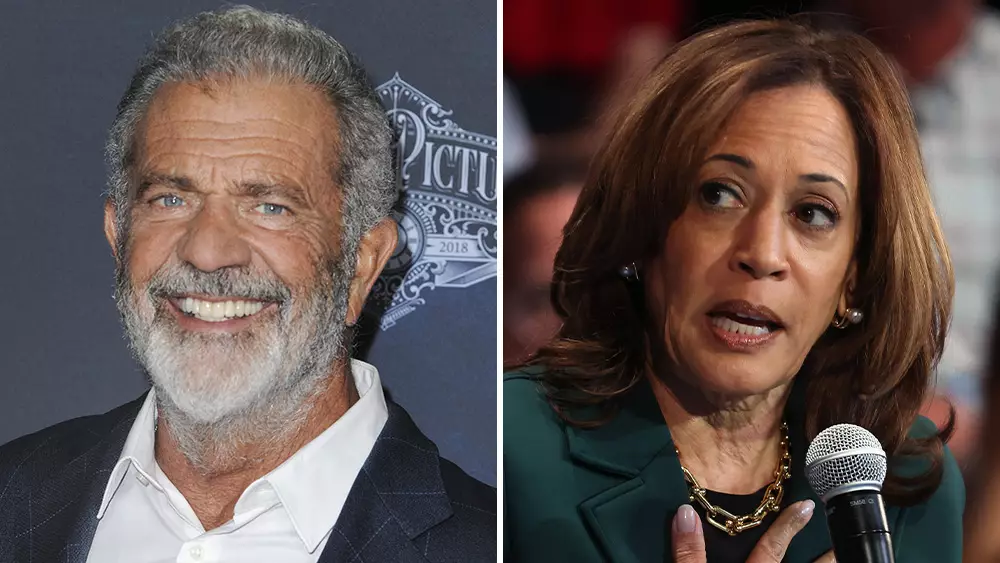In the landscape of modern Hollywood, Mel Gibson stands as a figure both revered and reviled. Once celebrated for his cinematic achievements, he has since become entangled in a web of scandal and public criticism. Recent comments made by Gibson regarding Vice President Kamala Harris have reignited debate about his character and the implications of his public persona.
Andrew Garfield’s recent praise for Gibson, commending him for his personal growth and ‘healing,’ stands in stark contrast to the actor’s latest outbursts. Caught off guard by TMZ cameras at LAX, Gibson didn’t hold back when he referred to Kamala Harris as having the “IQ of a fence post.” Such inflammatory remarks raise serious questions about the sincerity of the healing process Garfield lauded. If Gibson indeed has experienced a transformation, his disparagement of Harris suggests that perhaps some parts of his character remain unchanged. Coupled with his declaration of support for Donald Trump, these statements are particularly troubling.
Gibson’s comments not only reflect a personal bias but also echo hostile rhetoric increasingly prevalent in political discourse today. The direct comparison of political figures to inanimate objects serves only to dehumanize them, fostering an environment where constructive dialogue is drowned out by aggression and insult.
The disdain Gibson has shown is not new; rather, it resonates with his history of controversial statements and actions. Following a DUI arrest in 2006, Gibson’s antisemitic tirade unveiled a side of him that many had hoped was in the past. His subsequent remarks about women, racial slurs directed at his former partner Oksana Grigorieva, and overall abusive behavior painted a picture of an individual struggling with deeply entrenched issues of respect and accountability.
Witnessing Gibson perpetuate this pattern of degrading commentary—even towards high-ranking public officials—is disheartening. It poses an uncomfortable question for many: Can individuals with such pasts truly reform, or do they simply learn to mask their sentiments under slick platitudes and crafted images?
The political arena’s toxic atmosphere often amplifies such derogatory commentary. For instance, Trump’s own derogation of Harris—where he commented that she provides answers “from a loony bin”—is indicative of a broader trend towards personal attacks rather than political discourse. This pattern inevitably leads to a more divided society, stifling rational conversation around policies and governance.
In this sense, Gibson’s recent comments can be viewed as a reflection of this toxic surrounding, serving to sensationalize rather than substantiate political viewpoints. Calling Harris stupid does nothing to illuminate the political conversation; it fosters division rather than understanding, and perpetuates a culture where individuals are judged not based on their policies but rather personal attacks directed at their intelligence.
As public figures, actors and directors wield significant influence over public opinion and discourse. The recent words of Gibson have profound implications—not just for his reputation, but for the culture at large. By endorsing figures like Trump and expressing disdain for Harris, he sets a troubling precedent that seems to sanction unacceptable behavior and thought.
While Gibson may choose to embrace support for Trump, it is essential for fans and observers to hold him accountable for his words. The public’s response could play a crucial role in determining whether such statements are tolerated or deemed unacceptable. Ultimately, it’s not just about one man’s views; it’s about the atmosphere being cultivated for future discussions and the healthy discourse society desperately needs.
Mel Gibson’s recent statements are not just another chapter in an ongoing saga of controversy but represent a critical reflection of our societal norms. Addressing the divisive commentary prevalent today, both in Hollywood and beyond, might help in steering the conversation back towards a more respectful and constructive discourse. It is time for both the public and industry to reconsider the impact of enabling problematic figures and the narratives they promote.


Leave a Reply